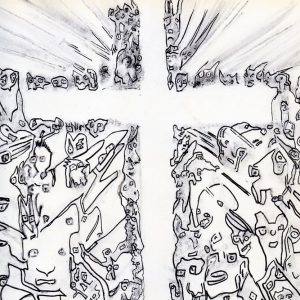οὐ φροντὶς (ou phrontis) – ‘Wyworri?’
“How dull life would be if we did not
accept anything we could not explain!”
So wrote one of the pioneers of ecological forestry and Earth healing, Richard St. Barbe Baker (1889-1982), in his foreword to Dorothy Maclean’s ‘Call of the Trees’.
“For my part, I would rather be a believer than an unbeliever. It would be conceited to be otherwise, when there is the miracle of sunrise and sunset in the Sahara, the miracle of growth from the tiny germinating seed to the forest giant. Let us accept that miracle of growth as fact and as a living symbol of the Tree of Humanity and the Oneness of Mankind and all living things.”
I will never forget the Rhododendrons in the Himalayas at Shimla in the early monsoon hours; the morning mists, the appearance of a baronial mansion at the top of the hill. The tenacious grounds of Lord Dufferin’s Viceregal Lodge.

Similar in atmosphere to the estate lodge, near Loch, in the Highlands; another pleasant garden of Rhododendrons.
Last summer in Dorset there is Clouds Hill,
a woodsman’s cottage, refitted by spartan
T.E. Lawrence
A forest of Rhododendrons:
“There are also oak trees, an ilex, birch, firs, laurels and heather. The Rhododendrons are profuse and wild in the hollow of the heath.”
(a change from benevolent palm)
“I had dropped one form and not taken the other, and was become like Mohammed’s coffin in our legend, with a resultant feeling of intense loneliness in life, and a contempt, not for other men, but for all they do. Such detachment came at times to a man exhausted by prolonged physical effort and isolation. His body plodded on mechanically, critically on him, wondering what that futile lumber did and why. Sometimes these selves would converse in the void; and then madness was very near, as I believe it would be near the man who could see things thorough the veils at once of two customs, two educations, two environments.” –T.E.Lawrence, Seven Pillars of Wisdom (1926).
Above the lintel there is a Greek inscription:

Ou Phrontis
or Hippoclides doesn’t care
“The words, carved in Greek characters, are normally transcribed Ou Phrontis. They come from Herodotus, VI, 129. In a letter to Celandine Kennington of 18.10.1932 Lawrence explained: “In Athens was a gentleman called Hippoclides who became engaged to a rich merchant’s daughter: and they arranged him a slap-up and splendid marriage. The feast preceding it was too much for his poor head, though. He stood on his head on the table and did a leg-dance, which was objectionable in Greek dress. ‘Hippocleides, Hippocleides’ protested the shocked merchant ‘You dance your marriage off.’ ‘Wyworri?’ said Hippocleides: and Herodotus tells the tale so beautifully that I put the jape [‘Why worry’] on the architrave. It means that nothing in Clouds Hill is to be a care upon its inhabitant.”
| D. Garnett (ed.), Letters of T. E. Lawrence (London, Jonathan Cape, 1938 |
[p. 746]
Harry Matthews
un poète et peintre
